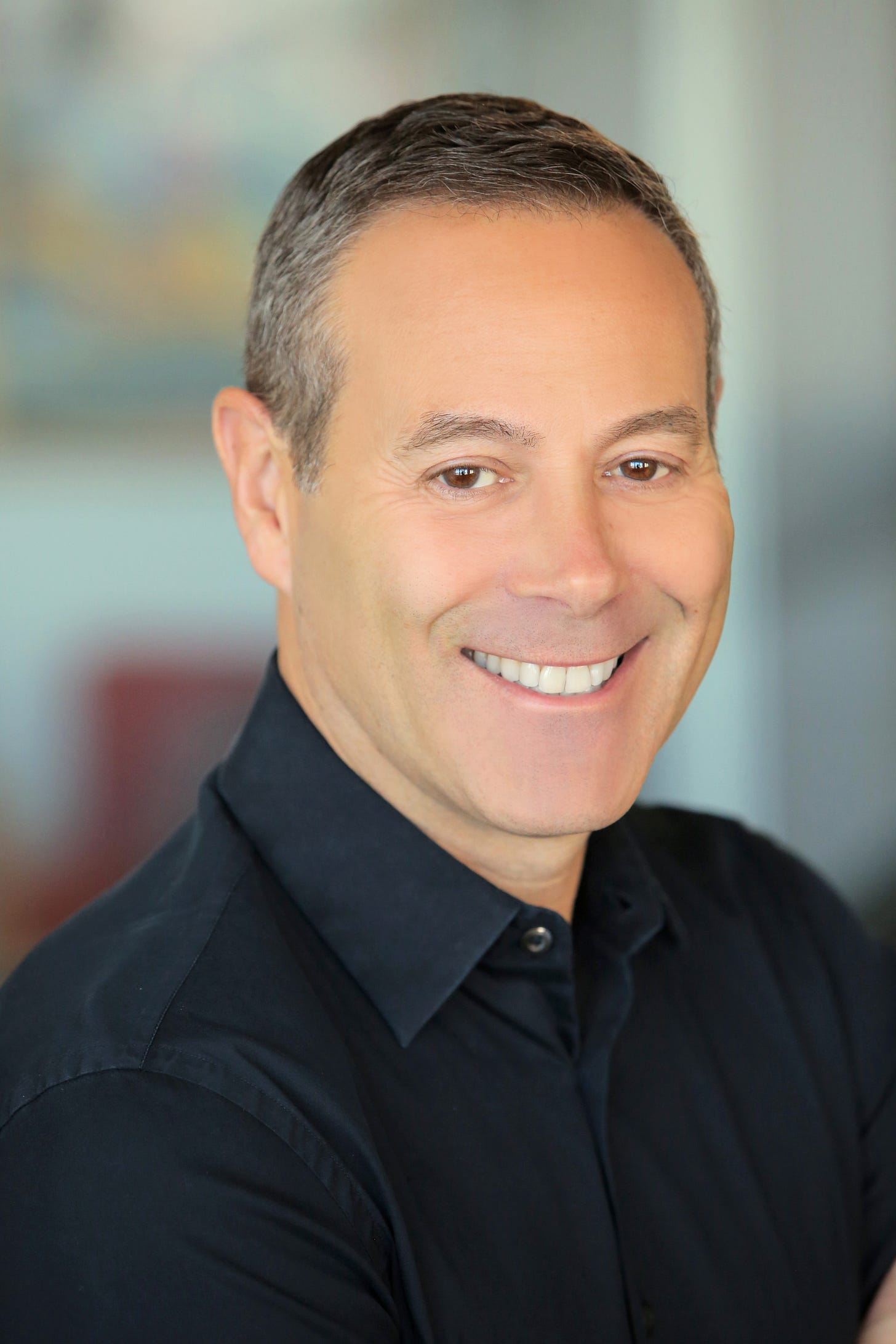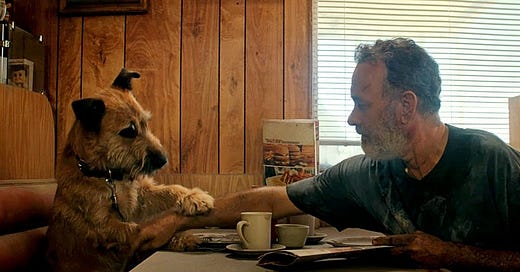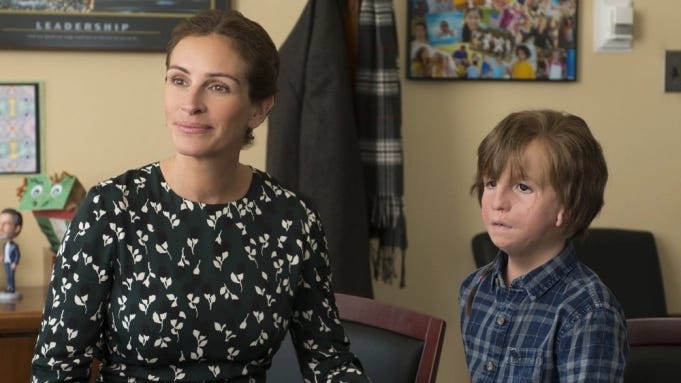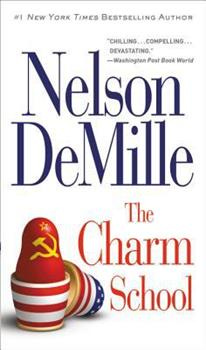Walden CEO Frank Smith: "We are Looking to Spend Money."
The head of the family entertainment company on their aggressive plans. “I'm looking for the things that you would not think are necessarily family"
If you’re a creator of any kind — an author with a book, a producer with a project, a writer with a script, pay attention to today’s Q&A with Frank Smith, the President and CEO of Walden Media, which specializes in films and TV series for the family.
Notable Walden Media projects include the Tom Hanks post-apocalyptic survival drama Finch on Apple TV+, theatrical releases such as The Chronicles of Narnia and a series adaptation of The Babysitters Club for Netflix. The company also operates the Walden Pond Press publishing imprint in partnership with Harper Collins, which focuses on middle-grade books and has yielded a Newbery Prize winner and other accolades.
The biggest takeaway from our conversation: Walden, which is backed by the deep-pocketed Anshutz Entertainment Group, is looking to spend as it expands the definition of a family film. Smith uses the term “co-viewing,” to describe projects that multiple generations of a family can enjoy together. “Understand we are looking to spend money. I'm looking for IP,” says Smith, who joined Walden in 2003 from New Line Cinema/Fine Line Features where he had been VP of Business and Legal Affairs. “I'm looking for the things that you would not think are necessarily family. I'm looking to do some spy thrillers. I'm looking to do more dramas.”
I’m really interested in the family space, especially as it feels like there has been pullback on that kind of programming of late. It’s also interesting how an expansive idea of “family entertainment” can be a proxy for broad four-quadrant material. It’s a great conversation — insightful and wide-ranging — that’s really got me thinking. (Plus, isn’t it exciting at a moment when it feels like other companies are pulling back to hear someone talk about growing?)

Optionist: Let’s start on a broad level. What's a family film?
Frank Smith: I think if you go back 20 or 25 years ago, if we said family film, you would think something very traditional, Disneyesque, intended for a younger audience. Nowadays, things have changed. Tastes have grown. The country has changed. How we consume and where we consume — kids are watching unfiltered stuff on cable, or on Netflix or whatever. So I do think what is a family film has changed. Family for Walden today includes Finch, which we made with Apple. It includes the softer side of PG 13. Not intended for young kids, but young kids could watch it. It's really intended for something that's four-quadrant that adults can watch with their older kids/teenagers and talk about. We just got done shooting Manhunt for Apple, which is based on the hunt for John Wilkes Booth from the book by James Swanson, which we've had for years. And by the way, thanks to streaming, it’s not a 90-minute feature, but a seven-part limited series. I consider that a family film today.
How is Manhunt made for families?
We always look to get the broadest audience possible. We're still not looking for anything that has too much violence or language or sexual content. It's still going to adhere to what Walden was set up to do — make quality, inspirational family entertainment. You can make adult dramas. You can go a little dark as long as you show the redemption, and you do things tastefully. You don't need to go that edgy. I don't think anyone ever walks out of a theater and says, “Oh my gosh, I didn't hear the f word."
Is there a distinction between a family film or series and a kids’ one?
I don't think we've ever done a kids' film. I think everything we did is family space, including animation. We did an animated version of The Star, which is the nativity story. It was intended to tell the story in a sweet way for a younger audience, but we made a film that adults can enjoy. I think we've made thought-provoking films that have kids’ stories in them.
What about something like Dora the Explorer?
I think we made a movie that adults can sit through and really enjoy themselves. What you want to do is you want to entertain the whole family. You want to give them something to talk about when they get in the car or go for lunch afterward. No matter who your target audience is, you’ve gotta make it as broad and appealing as possible.
Has the young viewer changed? Are they different in 2022 compared to 1992?
Well, from 1992 to now, I think kids are far more sophisticated, far more savvy computer-wise, obviously. They're also more savvy about film and story so I think you can tell difficult storylines. In The Babysitters Club, a series that we did [on Netflix in 2020-21], we tackled some really complicated storylines for kids without getting into too much detail. We did it in the best way possible for the target audience and parents appreciated it. Kids are not dumb. They understand everything. That's the mistake I think a lot of people make – they dumb it down for kids. Give them difficult stuff, but just do it in a way that's acceptable.
“We've been making very, very aggressive offers on properties. Right now, we’re living in a very strange world in Hollywood; things are selling for far more than I think they are probably worth. But IP is very important right now.” -Smith
Has the pandemic changed content for you?
Personally, I can't say that the pandemic has changed the way we think about content. What the pandemic did teach us was that we were looking for ways for the family to come together. I heard this from all my friends and family — that everyone was in their own room doing schoolwork, work, whatever. It was great if they could find something that a multi-generational group could all sit and watch together.
It reminds me that great entertainment has always been multi-generational. Looney Tunes for instance, was for kids, but it was always more sophisticated, and parents could laugh at jokes children wouldn't get.
Agree. I think a good example of that is Finding Nemo. I sat through that movie and laughed. I enjoyed it. That’s a multi-generational movie or a term I often use to describe it is co-viewing. That's what we try to do here.
We hear a lot about kids suffering anxiety and stress because of the pandemic. Are you thinking about that in terms of content?
There's enough in this world that adds anxiety — school shootings, racism, bullying. There's so much constantly going on in this country to give children stress. We're not creating content to deal with one specific set of stresses for kids. I'm gonna harken back to Wonder [the 2017 film with Julia Roberts, produced by Walden]. It does a great job of dealing with the stress that kids go through with bullying and insecurities and tells the story in a very tender way. I think with kids there’s always gonna be something stressful, especially now. We're just looking for those things that help kids understand that you're not in this alone — everybody's suffering from the same fears and stress and anxiety.
We're in a moment where it feels like the business is retrenching.
I think about it every day [laughs] trust me. I just got back from the Zurich Film Festival and a panel with Patrik Berger and Christine Vachon and other great people. We were discussing this exact subject. Patrik and I made Wonder together. Could we release that in the theaters today? Would it do the kind of business that it did in that it did pre-pandemic? I don't know. Things have changed. It seems to be big Marvel movies, big concept movies. The Chronicles of Narnia would still fit into that. But a lot of the films that we've had success with at this company, I'm not sure if they would get a theatrical release today, that could change five years from now or not. Today they would probably go to streamers, and they would have success in a different way.
Even before the pandemic, the rise of Netflix and the other streamers made us think where are we in this pecking order? We started doubling down on streaming. The past couple of years, we've had some luck. We put the time and energy in. I had [a conversation] during the height of the pandemic with a CEO of a similar-size company to Walden. He called me up in a panic because he said if he can't release his movies and he has no relationships with the streamers, and his company is not engineered to do streaming deals because of the way their money comes in, he doesn't know what he's gonna do next or how long he can survive. He asked me how long it took me [to get going on streaming] because it seemed like Walden all of a sudden had The Babysitter’s Club, The Babysitter’s Guide to Monster Hunting and Finch. I said it took a couple of years. And so this particular company is struggling right now.
I think the beauty of Walden is that we have had the luxury of being able to be nimble and react quickly and swiftly to the changes in the industry. So when I started to see that Netflix was really getting popular — I myself was watching a lot of Netflix – I started to look to see how much family stuff is on there. I realized there's great opportunity. We just talked about this in Zurich. A lot of the independent filmmakers were bashing streamers. I argued — I was the only one on the panel that argued no. Manhunt is a project that's fifteen years old. It was intended to be an hour and a half. It was dropped by Disney. It's not only seeing the light of day but seeing the light of day with an enormous budget in a seven-part limited series because of streaming.
If it were a theatrical release, I wouldn’t have taken the risk with it. I may have had another hit on my hands and a cash cow. I may have lost money. I got this made. I know what my profits are, they're built in. I'm hoping that a lot of people watch it. Of course, I know Apple will support it, because I know their operation. What I've realized for Walden is we have to double down on streaming. We still keep a toehold in theatrical features. I'm covering all my bases.
“I'm also out there looking for things that you wouldn't think would be Walden, like Finch and Manhunt. I'm looking for the things that you would not think are necessarily family. I'm looking to do some spy thrillers. I'm looking to do more dramas.” -Smith
There’s a lot going on with some big companies pulling back, notably Warner Bros. after its merger with Discovery. Is there retrenchment in family programming?
I think it has more to do with what Warner Bros. wants to focus on and what HBO Max wants to focus on, and less to do with the demand out there. I think they're trying to be more curated. Family is not going anywhere.
Have you optioned any games?
We haven’t. We've been pitched. What we've thought of with a lot of these games is you probably can make a movie out of this but how do you make it something Walden?
How about podcasts?
In terms of making one, I feel like that's a completely separate business. It's not our focus right now. As far as being pitched podcasts to develop, we've looked at a few but haven’t optioned any. What's compelling as a podcast, what's compelling as a game — and maybe financially successful when they develop it — may still not be what we think of as Walden. We're very protective of that Walden brand. We did a survey on our brand right before the pandemic. [Smith clarified after: It was a sophisticated brand attachment study by UTA he cited]. Number one, I was pleasantly surprised at how recognizable our brand is, and number two, the trust factor. Parents put us second only to Disney. They put us ahead of a lot of our competitors saying that our competitors were making basically junk food for the kids. They thought that our films and now television are compelling storylines, thought-provoking, heartwarming and good messaging for the kids.
Journalism?
We're still looking at articles, and we just made an offer on an article.
How much time elapsed between when you saw the article and when you made an offer?
Two days. We read it and the next day we found out there were already offers, so by the day after that we made an offer.
IP has gotten very competitive
Very, very competitive.
Has that changed your approach?
The great asset we have is deep pockets. Walden is well-funded. We have a lot of money for development and acquiring IP. It was easier when we weren't dealing with streamers. If something got really expensive and we were competing against the studios, I would call two or three of the studios that were competing and say, if you get it, we'll share it with you. If we get it, we'll share it with you and then we'd wait and see.
You don't find that with the streamers. They're not interested in doing those kinds of deals. So, it forced us to say, I can't sit on the sideline and see where that book is going and then jump on it with the studio partner. I'm gonna have to get in there and get really competitive. And so we've been making very, very aggressive offers on properties. Right now, we’re living in a very strange world in Hollywood; things are selling for far more than I think they are probably worth. But IP is very important right now. And to be relevant, you need to have that hot IP. So we are spending and getting very aggressive.
The argument that I make if they say, “the streamer's gonna pay me more” is, well you're gonna be one of many thousands in development in the streamer. You could be one of a couple of dozen things that we're taking very seriously here. And we won't take it out until we're all in agreement that is ready to be taken out. And then we'll take it out at a very high level and create interest.
In this competitive world that we're in, when you're going after IP, you have to be really aggressive, and you have to be able to have the deep pockets to be aggressive. And I have that luxury here.
“Things that couldn't get made are getting made now because there's a place for them and a real budget for them. So yes, you should go back and look at old stuff. Every company should. There could be a buried treasure in your old development.” -Smith
What are you not getting offered that you were offered before?
If you are a company that made a Narnia, that's what people tend to bring you. The interesting thing about a smaller company like us is we've done that. That's not to say we wouldn't do something else similar, but not what we're after looking for. I'm also out there looking for things that you wouldn't think would be Walden, like Finch and Manhunt. I'm looking for the things that you would not think are necessarily family. I'm looking to do some spy thrillers. I'm looking to do more dramas.
What would a Walden spy thriller look like?
Well, we have two in development.
Of course. Billion Dollar Spy, based on the true story of one of the US’s most valuable late-Cold War spies. And what's the other one?
Nelson Demille's The Charm School.
Charm School is a great cold war thriller from the ’80s [Think The Americans meets The Manchurian Candidate] that hits home how important backlist titles are in this competitive market.
Absolutely. If you can take a 15-year-old project such as Manhunt and turn it into something incredibly timely and relevant and hip and well done as a limited series with a large budget, you have to go back and look at some of your old projects, which we've been doing. We've owned Charm School for years — the company's only been around about 22 years and we've had it for probably eighteen or nineteen years. By the way, this is what I spoke about on that panel. You can trash these — that the streamers killed the independent film market, but my films are getting made. Things that couldn't get made are getting made now because there's a place for them and a real budget for them. So yes, you should go back and look at old stuff. Every company should. There could be a buried treasure in your old development.
“[Walden Pond Press] was never intended to be a driver of IP for the company, although we do have an opportunity to option these books and develop them. We're not purposely publishing books that we feel like are gonna be great as a Walden film. The tail doesn’t wag the dog. Publishing does what publishing wants to do.”-Smith
With the backlist, is it only stuff that you own? Or are you actively looking at stuff that either never got optioned, or maybe where the option has lapsed?
Under our Walden Pond Press imprint with Harper Collins, we have a look at their back list. Of course, we have all the traditional routes at looking at things. Having streamers out there gives you a wealth of opportunity for projects that you didn't think could get made, or were too hard to tell the story in a feature film. Queen's Gambit was intended to be a theatrical feature. I can't imagine that you could have told that story that well in an hour and a half.
I feel like there used to be a stigma with books that weren’t originally optioned or didn’t get made.
I think the town gets tired about hearing it. You have to put those on the shelf, take a breather, hold onto the rights if you can. You can't keep the underlying rights to everything. You have to pick and choose what's worth spending the money on.
Tell me more about your publishing imprint with Harper Collins.
Our Walden Pond Press is in the middle-grade space. We used to have a huge outreach program out of the Boston office, which would do educational outreach and faith-based if it was organic to the film, more so education, because most of the books we were doing were read in schools. We realized that since we were dealing with outreach that publishing was a good fit too. It's a great way to get kids to read books and tell inspirational stories. It was never intended to be a driver of IP for the company, although we do have an opportunity to option these books and develop them. We're not purposely publishing books that we feel like are gonna be great as a Walden film. The tail doesn’t wag the dog. Publishing does what publishing wants to do.
What advice would you give someone in Hollywood, either a company or an individual who was thinking about starting a publishing imprint?
I’d ask what their motivation is. If their motivation is strictly to put goodwill out there in the world, and also as a business model, then I would say, okay. But if the motivation is they think they're going to find the next Harry Potter and develop that into this huge film franchise, I think that's a bit unrealistic and that's not what you should be doing.
Does the return on the publishing justify the time you spend on it?
Our publishing group manages itself. It does require me to take meetings and calls here or there, but it doesn't take a tremendous amount of my time. They're self-sufficient. It's not huge, but it's prestigious and it is profitable. We're very proud of it. Our books have won Newberry Awards. They're read in schools, and we think that's an important aspect of what we do.
There are not other companies in Hollywood that necessarily can say they’ve won a Newbury Medal, which is the most prestigious prize for children’s literature.
A lot of studios have their prestige art house brands right at the studio. This is our prestige thing. Sometimes, me being here, I lose sight of it. When I go for the meetings in New York, it refreshes me as to why we're still doing this, because you realize how prestigious it is.
As you say its a low-margin business and it's very labor intensive — editing a book takes a lot of time.
It takes a lot of one-on-one. It's going to the place of prestige. I wouldn't be surprised over the next 10 years to see publishing houses bought by very deep-pocketed companies or individuals. People are afraid of that happening. You don't want all the information in one particular set of hands. But I think that's where we're heading, because it's a prestige business.
Have you learned something from the publishing part of the business that's changed how you think about your work out here, either directly or indirectly?
Change or die.
Do you think publishing hasn't changed enough?
I think it was one of the industries that have fought change. Books have been books long before movies and television were around, and I think the industry was slow to the changes. There's very few players. They've consolidated so many of the big publishing house. The margins are very narrow. It's a very tough business.
Before I go, is there anything I haven't asked you about that you want to say?
Just understand we are looking to spend money. I'm looking for IP. I’m looking to create deeper ties with the streamers and keep my ties with the studios. Every time a movie comes out, I look to see, is this our space? Would we have released this theatrically? What did the finances look like? I’m an opportunist.






